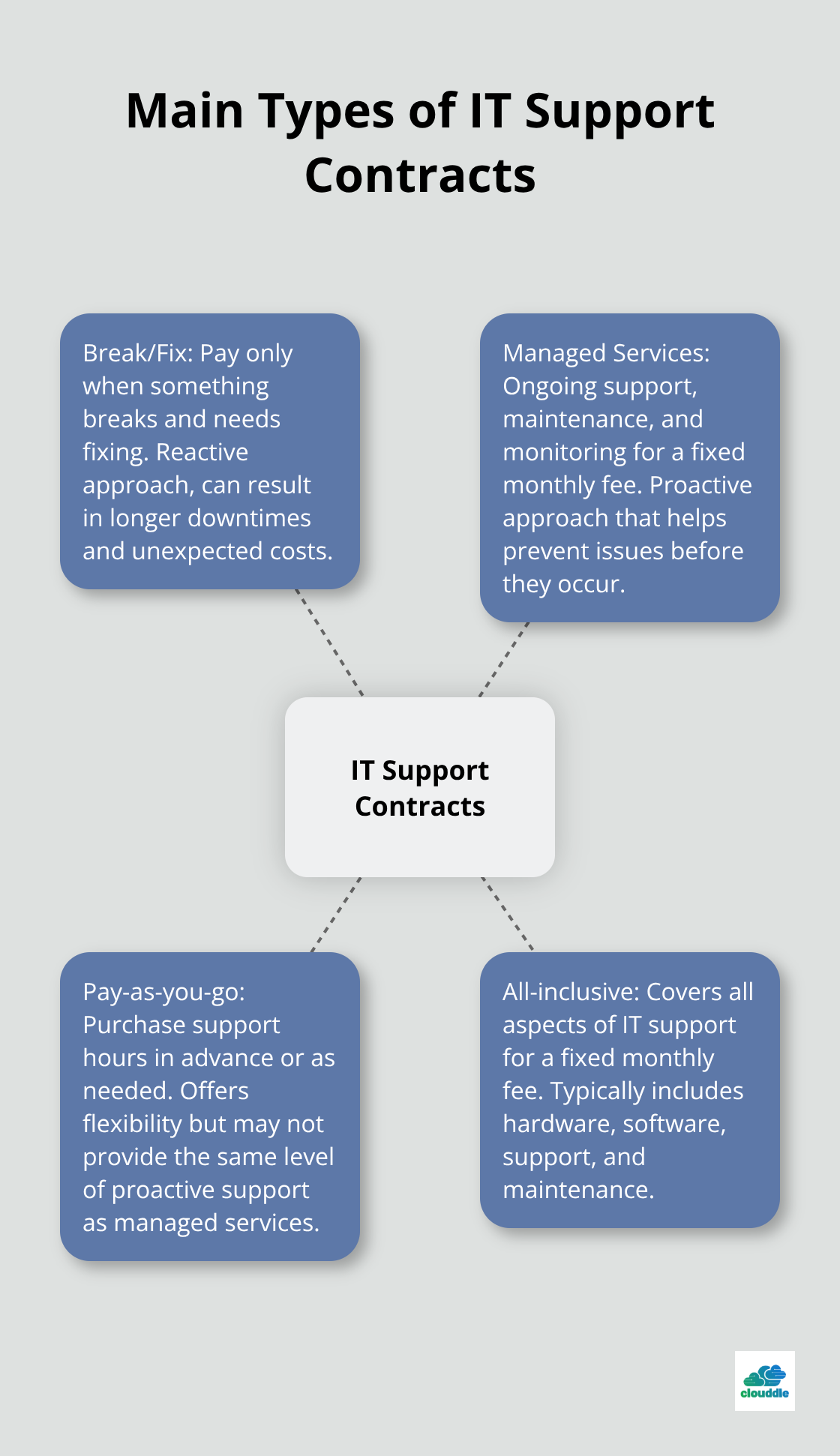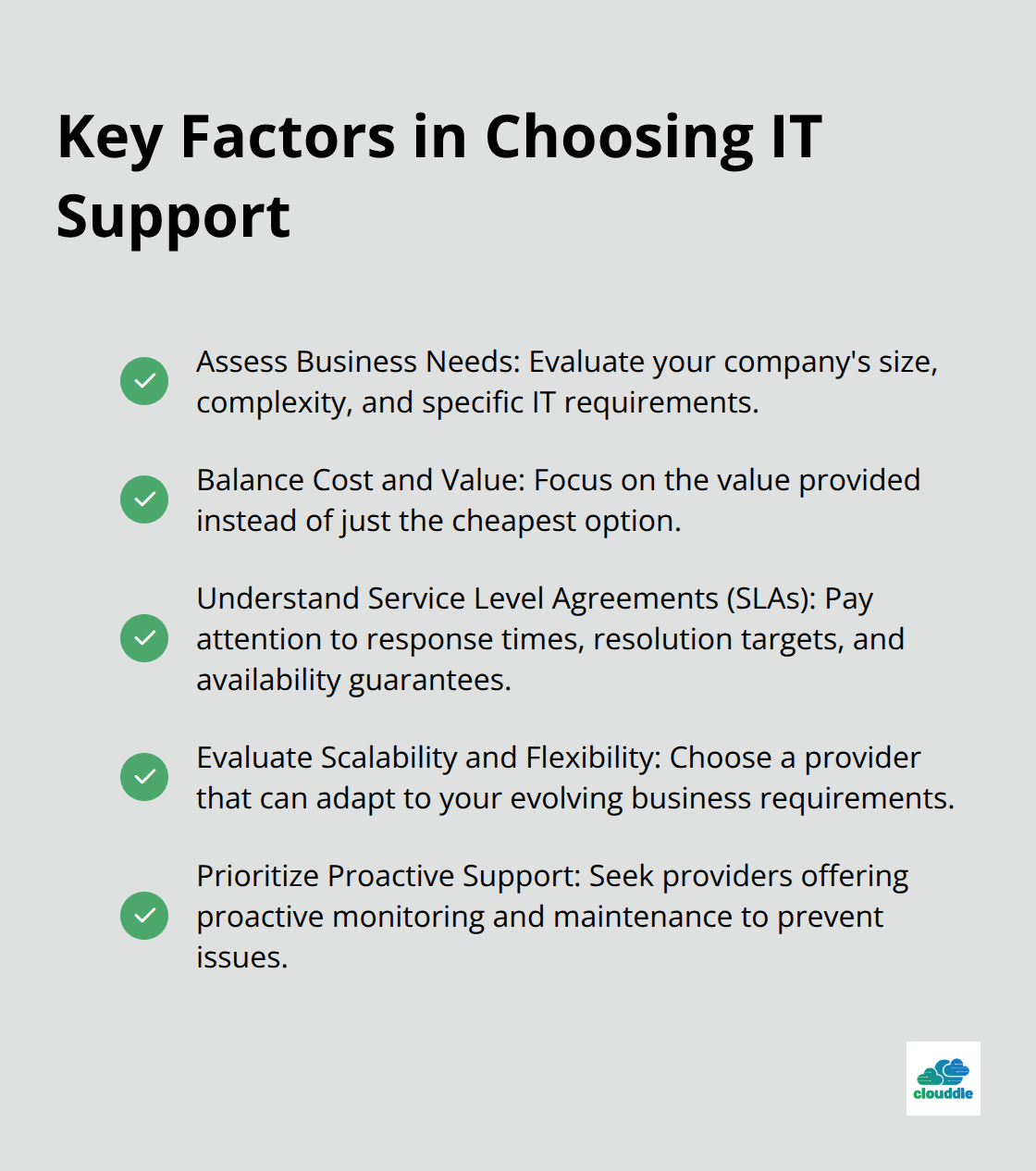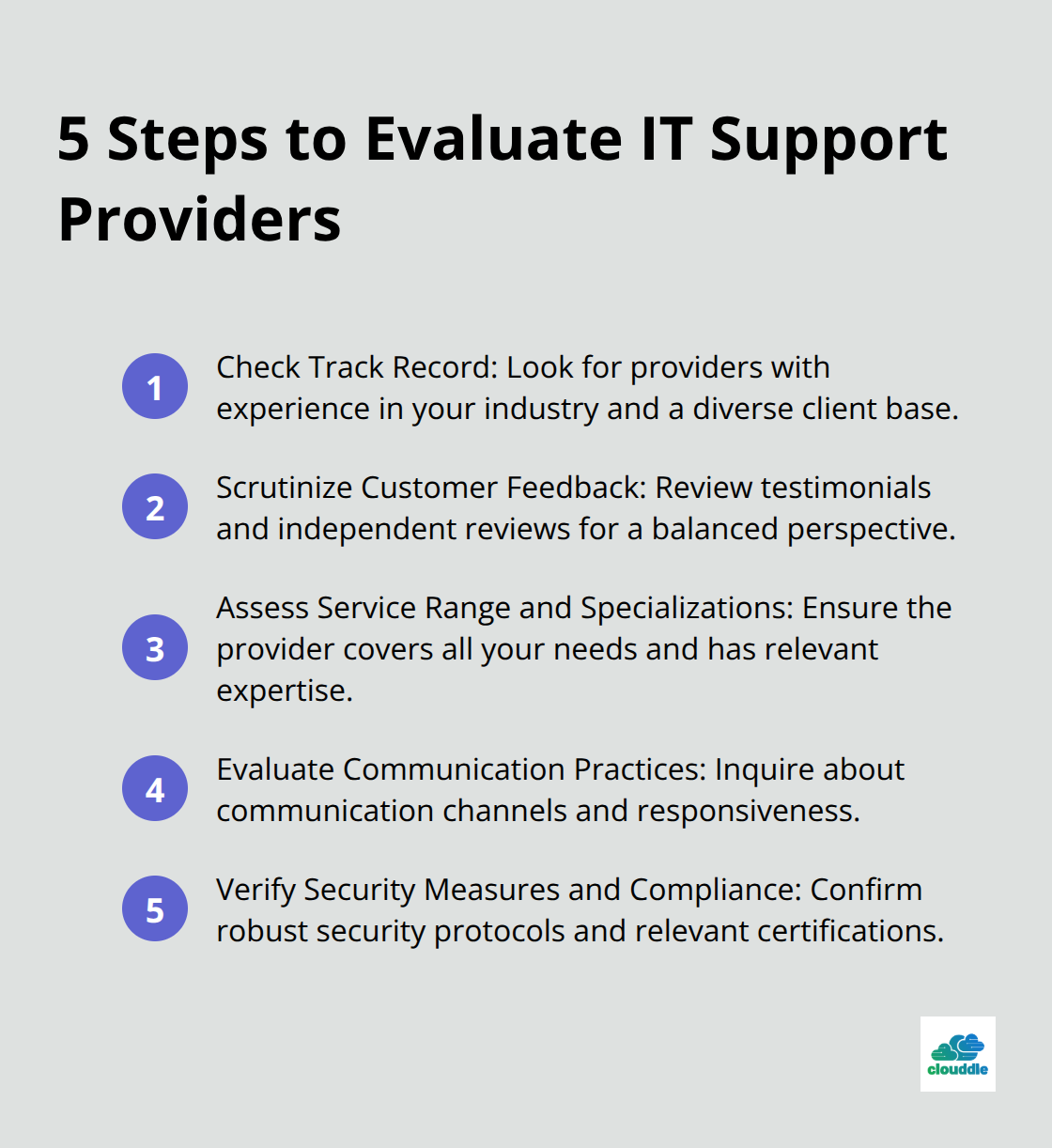Choosing the right IT support contract can make or break your business operations. At Clouddle, we’ve seen firsthand how the proper support can boost productivity and minimize downtime.
IT support contracts come in various forms, each tailored to different business needs and budgets. This guide will help you navigate the options and select the best fit for your company.
What Are the Main Types of IT Support Contracts?
IT support contracts come in various forms, each designed to meet specific business needs. Let’s explore the main types of IT support contracts to help you make an informed decision.

Break/Fix Contracts
Break/fix contracts represent the most basic form of IT support. You pay only when something breaks and needs fixing. This model can appear cost-effective for small businesses with minimal IT needs. However, it takes a reactive rather than proactive approach, which can result in longer downtimes and unexpected costs. Break-fix services might charge more compared to contract costs, especially for businesses with regular IT needs.
Managed Services Contracts
Managed services contracts offer a more comprehensive approach. They provide ongoing support, maintenance, and monitoring for a fixed monthly fee. This proactive model helps prevent issues before they occur, which reduces downtime and improves overall system performance. Managed IT services offer numerous advantages, including proactive monitoring, reduced downtime, cost savings, and access to specialized expertise.
Pay-as-you-go Contracts
Pay-as-you-go contracts offer flexibility, allowing businesses to purchase support hours in advance or as needed. This model works well for companies with fluctuating IT needs or those who want more control over their IT spending. However, it may not provide the same level of proactive support as managed services contracts.
All-inclusive Contracts
All-inclusive contracts (sometimes called “all-you-can-eat” contracts) cover all aspects of IT support for a fixed monthly fee. These contracts typically include hardware, software, support, and maintenance. While they can cost more upfront, they offer predictable costs and comprehensive coverage.
When selecting an IT support contract, consider your business’s specific needs, budget, and growth plans. The cheapest option doesn’t always prove the most cost-effective in the long run. Try to assess the potential impact on productivity, downtime, and long-term growth when making your decision.
Now that we’ve covered the main types of IT support contracts, let’s move on to the key factors you should consider when choosing the right contract for your business.
What Factors Matter Most When Choosing IT Support?
Selecting the right IT support contract requires careful consideration of several key factors. We’ve identified the most critical elements to consider when making this important decision.

Assess Your Business Needs
Start by evaluating your company’s size, complexity, and specific IT requirements. Influential Software suggests considering six key things when looking for an IT support contract: what you get, what you don’t get, response and resolution time, and how long you’ll be committed.
Balance Cost and Value
Budget plays a significant role, but it shouldn’t be the sole determinant. Cheap IT support often results in costly downtime and security breaches. Focus on the value provided instead. Look for providers that offer transparent pricing models and flexible plans that align with your budget without compromising on essential services.
Understand Service Level Agreements (SLAs)
SLAs are foundational agreements between your IT team and customers that are important in building trust. They manage customer expectations and define the scope, quality, and responsibilities of IT support. Pay close attention to response times, resolution targets, and availability guarantees. If your business operates 24/7, ensure your IT support does too.
Evaluate Scalability and Flexibility
Your IT needs will likely change as your business grows. Choose a provider that can scale services up or down based on your evolving requirements. Flexibility in contract terms is also important. Short-term contracts (or the ability to adjust services without penalties) can save you from being locked into unsuitable arrangements.
Prioritize Proactive Support
Seek providers that offer proactive monitoring and maintenance rather than just reactive support. Proactive IT support can prevent many network performance issues before they impact your business.
These factors will help you select an IT support contract that meets your current needs and positions your business for future success. The right IT support should feel like a partnership, not just a service provider. Now that we’ve covered the key factors to consider, let’s explore how to evaluate potential IT support providers to ensure you make the best choice for your business.
How to Evaluate IT Support Providers

Check Their Track Record
Experience matters in IT support. Look for providers with a proven track record in your industry. Ask about their years in business and the size of their client base. A provider with 10+ years of experience and a diverse portfolio of 100+ clients across various sectors might be a solid choice.
Don’t just take their word for it. Request case studies or success stories relevant to your business size and sector. These provide concrete examples of how the provider has solved problems similar to yours.
Scrutinize Customer Feedback
Customer reviews and testimonials offer valuable insights into a provider’s performance. Look beyond the glowing reviews on their website. Check independent review platforms (like Trustpilot or Google Reviews) for a more balanced view.
Pay attention to how the provider responds to negative feedback. A company that addresses concerns professionally and works to resolve issues demonstrates good customer service.
Assess Service Range and Specializations
A comprehensive service offering can simplify your IT management. Look for providers that cover all your needs, from basic helpdesk support to advanced cybersecurity measures.
However, breadth shouldn’t come at the cost of depth. If you have specific requirements (such as compliance with HIPAA for healthcare or PCI DSS for retail), ensure the provider has specialized expertise in these areas.
Evaluate Communication Practices
Clear, regular communication is vital for effective IT support. MSPs and MSSPs should implement feedback collection mechanisms like surveys, focus groups, and regular meetings with key stakeholders. This helps ensure that communication practices are effective and meet client needs.
Also, inquire about their communication channels. Do they offer a dedicated account manager? Can you reach support easily via phone, email, or chat? The answers to these questions can indicate how responsive and accessible the provider will be.
Verify Security Measures and Compliance
In today’s digital landscape, robust security measures are non-negotiable. Ask potential providers about their security protocols. Do they offer multi-factor authentication? What about endpoint protection and regular security audits?
Compliance is equally important. If your business operates in a regulated industry, ensure the provider is well-versed in relevant compliance standards. Ask for their certifications, such as ISO 27001 for information security management.
The right IT support provider should feel like an extension of your team, not just an external service. They should understand your business goals and align their services to support your growth.
Final Thoughts
IT support contracts play a vital role in business efficiency and growth. The right contract aligns with your specific needs, budget, and long-term goals. Factors beyond cost, such as provider experience, customer feedback, and security measures, should influence your decision.
IT needs change as businesses evolve and technology advances. Select a provider that offers scalability and flexibility to accommodate these shifts. Regular reassessment of your IT support needs ensures optimal value from your contract.
We at Clouddle understand the importance of tailored IT solutions. Our Network as a Service (NaaS) approach combines networking, entertainment, and security without upfront investment. This comprehensive solution aligns with the trend towards all-inclusive IT support contracts that offer predictable costs and extensive coverage.


